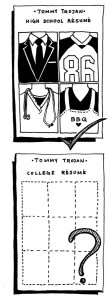Perfect is overrated, not worth the effort
“Nobody’s perfect.” It’s a popular and common phrase, but it hasn’t stopped anyone from trying.
Someone who takes the SAT twice with the goal of scoring a 2300 might be called a high achiever, but someone who takes the SAT over and over with the goal of scoring a 2400 is on an entirely different level.
Is perfectionism healthy? The field of psychology has had trouble answering this question.
According to the American Psychological Association, many psychologists make the distinction between good and bad perfectionism. They claim that while all perfectionists have impossibly high standards, plenty of perfectionists use those standards to motivate themselves — not everyone responds negatively to the inevitable failure to be perfect. As talented as Michael Phelps is, he probably wouldn’t have won 16 Olympic medals if he hadn’t felt the need to push for the impossible.
But Phelps directed his perfectionism toward one aspect of his life. General perfectionism, the need to be good at everything, isn’t just unrealistic. It’s boring. More than that, it stifles creativity.
There’s nothing wrong with trying to do your best, but you can’t try to do everyone else’s best too.
Remember college applications? To gain admission to USC, most of us probably exhibited some degree of general perfectionism. Forget being good at a few subjects — we had to join clubs, take on leadership roles and, for the sake of those admissions essays, find some time to have a quirky and enlightening life experience.
The strategy worked at the time, but it won’t work forever.
Now that we’re in college, we’re surrounded by overachievers. The accomplishment checklist has become more rigorous. Perhaps you have a high GPA, but where have you interned? Do you volunteer?
The glorification of the classic college experience puts even more items on the checklist. How many parties did you go to last weekend? When was the last time you worked out? Do you have Coachella Weekend 1 tickets?
The ideal college student doesn’t exist though. It’s merely a collection of standards, many of which have very little to do with one another. Human beings can’t be measured using an isolated set of criteria.
Your proficiency in one area is likely tied to your shortcomings in another. A student with a talent for seeing the big picture might write fantastic papers and score terribly on multiple choice exams. An extrovert might keep up with dozens of friends, yet lack trusted confidants. Trying to perfect every skill puts one at risk for upsetting this balance and undermining his or her unique abilities.
What’s more, many people downplay their own idiosyncrasies in an attempt to adhere to widely accepted criteria for success. But where would Facebook be if Mark Zuckerberg hadn’t decided to neglect his homework and start rating his classmates for attractiveness? Appropriately, The Economist titled its last article on Facebook “A fistful of dollars.”
In excess, all-encompassing perfectionism is literally deadly. The New York Presbyterian Hospital studied the relationship between perfectionism and anorexia in more than 300 women and found that the severity of the two factors is directly correlated. It’s unfortunate — but not surprising — that 40 percent of college women between the ages of 17 and 24 suffer from some form of disordered eating, according to OnlineUniversities.com.
Perfectionism is best in small doses. Practicing an instrument over and over makes sense. Taking the ideal of the well-rounded student and putting it on steroids is a recipe for misery.
It’s OK to fall off the wagon every once in a while. It’s OK to decide that some socially prescribed standards just aren’t that important to you.
In the immortal words of Ferris Bueller: “Life moves pretty fast. If you don’t stop and look around once in a while, you could miss it.”
Maya Itah is a senior majoring in communication. Her column “Tackling the ‘-Isms’” runs every other Thursday.


Pursuit of the truth, or finding and correcting falsehoods in our own received knowledge, is a form of perfectionism that affects many, and it isn’t always entirely conscious in the sufferer. We are all born into, and raised in, an ocean of lies, myths, and untruths, many of them conveyed to us by people who believe them, and many others by people who mean to benefit us with their lies. It’s around college age that some of us become aware of this, and an unfortunate few react to this by setting out to correct their information (see, Adam and Eve eating the fruit of the Tree of Knowledge).
Those pursuing careers in journalism/communication are especially susceptible to this threat, but the condition becomes literally lethal at the point where the inquirer sets about (again, often ignorant of the potential consequences) proclaiming, or even just admitting, his or her discoveries to others. The history of the Holocaust, of course, is a prime example, but there are many others.
Don’t get carried away with fact-checking, if you hope for a smoothly upward-trending career in journalism, or anything else. Pick the myths that are the most-rewarding and support them with all your might, if not your heart.
And as for the rest of the myths . . . go along with them. Or at least act as though you do.
By the way – NONE of the foregoing is meant to imply that our columnist Maya is guilty – or a victim – of any of this. But the advice is for her as well as anyone else.